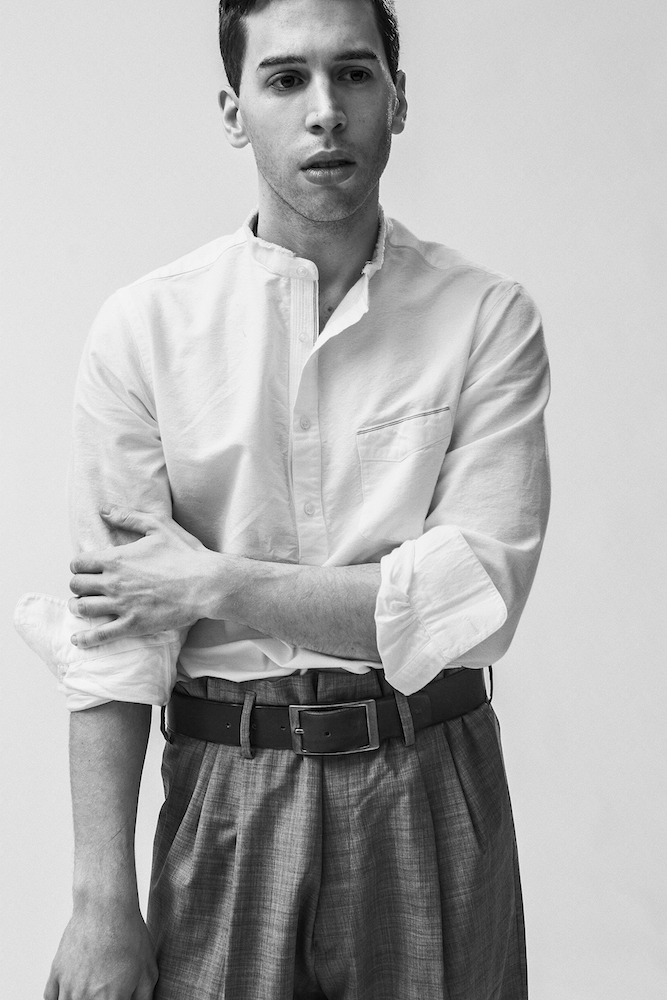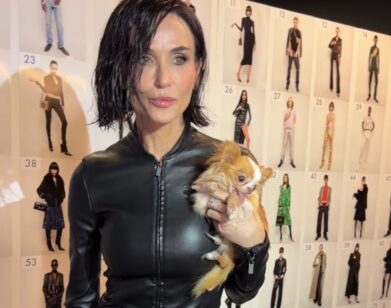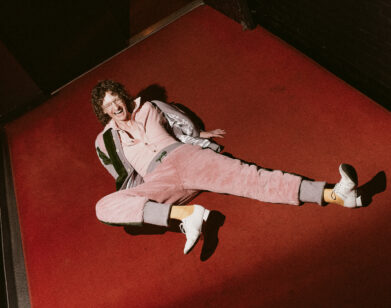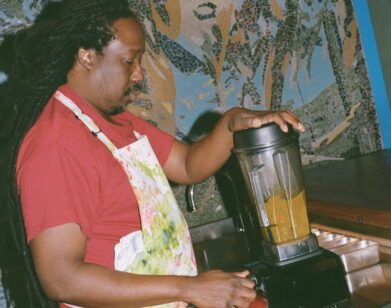Family Ties
ABOVE: JORDAN GAVARIS IN NEW YORK, APRIL 2016. PHOTOS: VICTORIA STEVENS. STYLING: SHIBON KENNEDY. GROOMING: LAURA DE LEON FOR CHANEL/JOE MANAGEMENT. SPECIAL THANKS: RR DONNELLEY STUDIOS.
There’s a reason Felix Dawkins is a fan-favorite on BBC America’s clone thriller Orphan Black. Played by Canadian actor Jordan Gavaris, Felix is funny, flamboyant, and fiercely loyal. “He’s very lithe and very territorial,” explains Gavaris over coffee in New York. “I used an animal exercise of a feline to find his physicality,” he continues. “I noticed that my back was more rigid, the movements of my hands and my limbs were a little bit more sexual.”
As protagonist Sarah Manning’s (Tatiana Maslany) foster brother, Felix is an honorary member of “Clone Club,” and is as integral to the group as Sarah herself. While, more than three seasons in, Sarah has plenty of blood relatives to keep her company, her bond with Felix has always been the strongest and most poignant on the show. “They had imprinted on each other from the time they met,” the 26-year-old actor continues. “He was hers and she was his, and that’s always how it was.”
Tomorrow, Season Four will of Orphan Black will premiere, and things are changing. Tired of being Sarah’s bedrock, Felix is asserting his individual identity. “To be needed is something that’s an integral part of Sarah and Felix’s relationship,” says Gavaris. “When things go wrong in Sarah’s world, Sarah turns to Felix…[being needed] gives us purpose, and I think Felix is losing his purchase on his sense of purpose.”
EMMA BROWN: When did you realize that you were good at accents?
JORDAN GAVARIS: I think I’ve had the facility for it since I was a kid. I was a big ham. I was the youngest child in a family of three; I had two older sisters. To be noticed I would do impersonations of characters on television, characters in film, and the accents were a natural evolution. It couldn’t just be a good impression; it had to be a really great impression. I played a lot of music—I was playing piano from the time I was really young. I’m not sure how true this is, but I feel like the same part of the brain that handles music handles languages and mathematics. I also pick up languages relatively easily, and I think that has a lot to do with that part of the brain. There’s a plasticity to it.
BROWN: Do you come from a creative family?
GAVARIS: Yes and no. They’re closet creatives. I think they’re people who fell into very routine fields, but could’ve been really creative people. My dad’s really a really neat guy. He’s very emotional and very emotionally available. I shouldn’t say it’s strange for a man, but it’s strange for a man who was born in the 1950s and grew up in a time when gender constructs were pretty rigid. He’s so warm and so extraneous. He’s a total dreamer and a natural actor. My mom’s also a very good actor, really maternal. They never pushed me to be particularly creative or artistic, I just found a home there. They never pushed me away from it, [but] I think they’d be happier if I had gone into a field that was a little more stable. There were a lot of conversations about my going into business or something in the financial sector.
BROWN: Did your older sisters tease you when you were growing up?
GAVARIS: More than anything, I spent a lot of time on my own because there was such a disparity of ages. My oldest sister is 10 years older than I am, and the middle child is five years older than I am. I spent a lot of time on my own, so my imagination was free to develop. I certainly wasn’t a popular kid in elementary school. I was a little shy, a little awkward. Didn’t have a lot of friends. As I got into middle school I was really an outcast. But everybody was an outcast in middle school. I don’t know who got the idea to put all kids going through puberty together in a school and give them academic elitism and competition and pit them against each other.
BROWN: You started acting when you were quite young.
GAVARIS: I started acting professionally when I was about 17. I worked immediately, but a year into it I did an independent film in Canada and that started it all. It was proof that maybe I could do this as a career. I took some time off. I entertained the possibility of studying psychology. I wasn’t a fan of business, but psychology is a field that’s integral to acting anyway. You have to be an observer and you have to have a preoccupation with human behavior. Psychology was a natural fit, but the approach was so clinical that it was just too dry for me. I quit the audition circuit for a year and then I went back, and I got a show very quickly after. It was a kids’ one-hour action-adventure, Unnatural History. It was really well written. It was a pre-teen, teen show, but it was a throwback to Buffy, which I just love so much. It’s different from Orphan Black. Orphan Black is independent television, it’s real cable TV and it’s very adult. This was pop art. But it was so much fun, and I had the best time shooting that television show. They ditched the show after the first season, which we all felt was coming even though the show was great.
That show is actually where I met John Fawcett, who’s one of the showrunners on Orphan Black. He came and directed one of the episodes. When you have rotating directors, you don’t often have the chance to really get to know one another. Television is blue-collar work. You clock in in the morning; you work 12,13 hours—sometimes 18 hours if you’re doing Orphan Black. Our interaction was relatively brief. He seemed like a nice guy. I didn’t think much about it until we bumped into each other three years later in the hallways for the initial audition for Orphan Black.
BROWN: You were talking about how actors need to have this interest in human behavior—need to be empathetic—yet actors are often thought of as quite narcissistic.
GAVARIS: It’s a weird duality. I think the narcissism comes from the industry side of things. The artistic side of a person is never narcissist; it’s always empathic, it’s always kind and compassionate. It can be difficult to hold onto artistic principles when the business is so glaringly about the product. It’s sad. As much as movies and television are about delivering a product, the process shouldn’t be about trying to get the product. It should be about making something interesting and innovative, something nobody’s seen before. But there’s this million-dollar pressure on your shoulders to show up and, by the third take at most, deliver the thing you’re supposed to deliver. Forget exploration; forget discovering something new about the character. Don’t ever deviate because the audience might not like that, and we don’t want to alienate the audience. I think we have this tendency to treat our audiences like children, and, by and large, they are now because we’ve treated them as such. We’ve fulfilled that prophecy. It’s no secret that movies are suffering and it won’t be long before television suffers a similar fate unless things change and we start to look at TV and film as an exploratory medium instead of a consumer medium.
People are very uncomfortable when you call actors artists because there are a lot of actors out there that aren’t artists—there are a lot of actors that are hired for very specific reasons that are shallow and have to do with sexual currency and what the industry thinks sells. Real actors are artists, they’re expressionists.
BROWN: When you first got the script for Orphan Black and went in for the first audition, what did it look like and how did you feel about it? It’s one thing to watch the show, but to try and explain it is quite difficult.
GAVARIS: My first thought was “this is a totally new way to deal with multiplicity, I’ve never seen this done before.” I liked that the main characters were not in any way redemptive during the first episode. They are, in fact, quite despicable human beings who are very confused and destructive. Playing what Hollywood determines is a hero, it immediately sets actors up to feel like they just can’t explore the dark parts of themselves—the character has to be likeable, has to be fuckable, has to be redemptive on all fronts. When you’re playing a character that’s just inherently destructive or messed up, you’re given this beautiful permission to try things. There’s a license to fail that we all felt we had on the first season especially. We’ve tried to hold on to that as the show’s gone forward. It’s hard when you develop a fan following because you’re making the show for someone.
I had never read anything like Orphan Black before. It was so grown up. For me at 22, having just done a children’s TV show, it was an amazing opportunity to be given a character that was so free. Although he’s politicized—you can’t play an LGBTQ character and not have him be politicized—the message of the show wasn’t blatantly political. It was very immersive. We laid these characters out for the world to see; they are politicized because of where they come from, but we’re not trying to make a political statement. Without trying to manipulate the audience in some way, you’re really kicking up dirt and having uncomfortable conversations.
BROWN: Was Tatiana already cast when you got involved?
GAVARIS: Actually, no. She was one of the options. They had three to four Felix options and three to four Sarah options. They tested us both on our own and together to see where the chemistry would work. Sarah being the protagonist, they knew that Felix would be her tent pole. He was a touchstone for her to come back to over the course of the season. There were so many rounds of tests. They weren’t precious about the process. We didn’t even know Felix was going to be English yet.
BROWN: Was Sarah originally Canadian as well?
GAVARIS: Sarah was always English. Felix was said to be younger when they immigrated, so he wouldn’t have had an accent of the same intensity. I had a lot of arguments against that—how it was actually more about him wanting to create a separation and a division between he and Sarah and the rest of the world. It would strengthen their bond. [During the auditions], John [Fawcett] would shout at me from across the room: “Okay Jordan, American Felix… North English Felix… South English Felix.” They did the same thing with Tat: “Cosima now,” and she’d take off her little Alison cardigan and put on her glasses and become Cosima. When they finally put us together—we were the only pair that didn’t get a chance to rehearse prior to the test—something happened with Tat. It was the X factor you hoped for. I felt this enormous trust in her as an actor. She’s just a generous person in general. It’s never about her, it’s always about the work and the process and making the art better. I don’t think we were the frontrunners—or I think she was, but I don’t think I was necessarily.
BROWN: The dynamic between Felix and Sarah has shifted. When we first meet Sarah, she’s a bit of a mess, and Felix is more stable. But now, Sarah isn’t a fuck-up anymore. She’s responsible for all of her sisters. How does that affect Felix?
GAVARIS: When we discussed the idea of Felix having a relationship, I championed it for a while. Then it changed. I really gave some thought to what it would look like to see him be intimate with a partner. I realized that was something Jordan wanted for Felix, but if I’m defending the character in all of his free-loving, open-spirited glory, I don’t think that’s what’s right for him. I think it’s a mistake to say that to be a healthy, well-adjusted person you need a monogamous relationship. I felt it was important to give a voice to members of the LGBTQ community who aren’t interested in a relationship, and I do think Felix is one of those people. So then the conversation changed to, “If he’s not getting a romantic relationship, what kind of relationship can we give him?”
BROWN: You’ve finished Season Four, do you get a bit of a break now?
GAVARIS: Yes. I’m going back to Toronto to house hunt and then just auditioning. Orphan Black has opened a lot of doors and occasionally I’ll get an offer for things, but generally the things you get offered are never things you want to do. It’s a continual fight for the good parts. As you climb the ladder and get to different benchmarks, enter new stratospheres, you’re just competing against all the other people in that stratosphere. After you win an Oscar, you’re competing with other Oscar winners. You hear them talk about it. You’ll always be fighting for those scripts. Even Sally Field has to audition.
SEASON FOUR OF ORPHAN BLACK STARTS TOMORROW, APRIL 14, ON BBC AMERICA.







